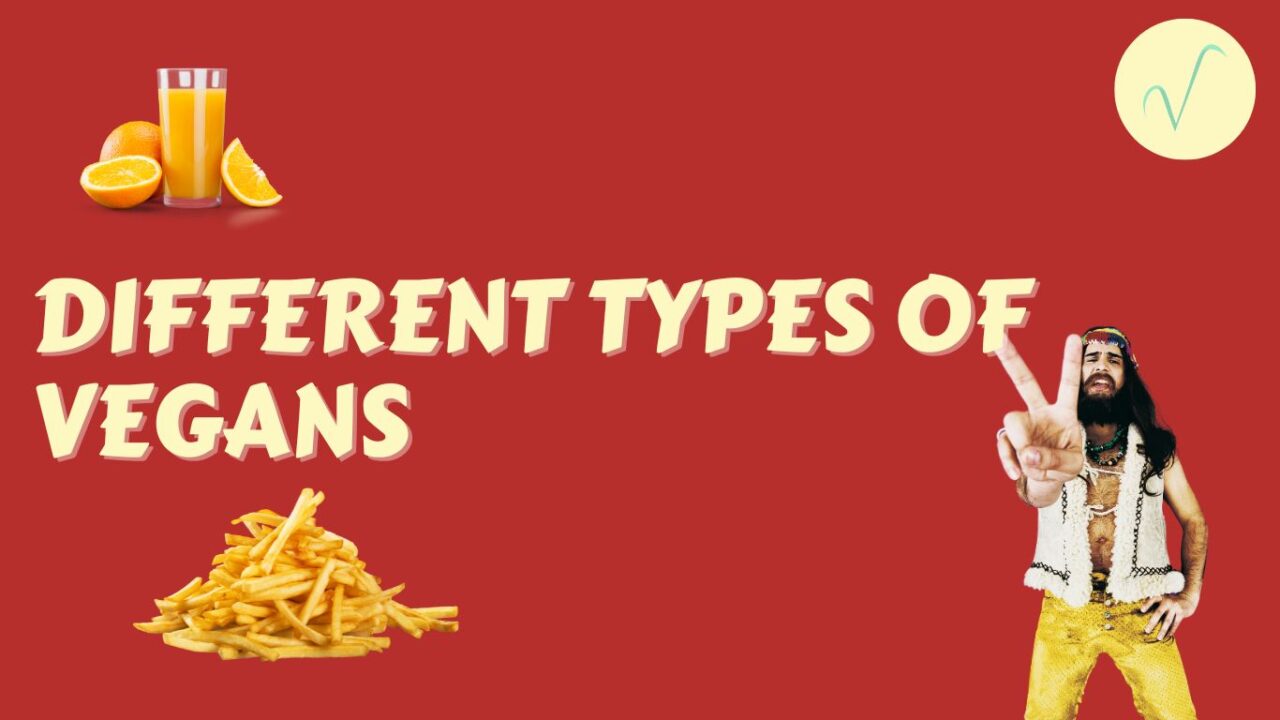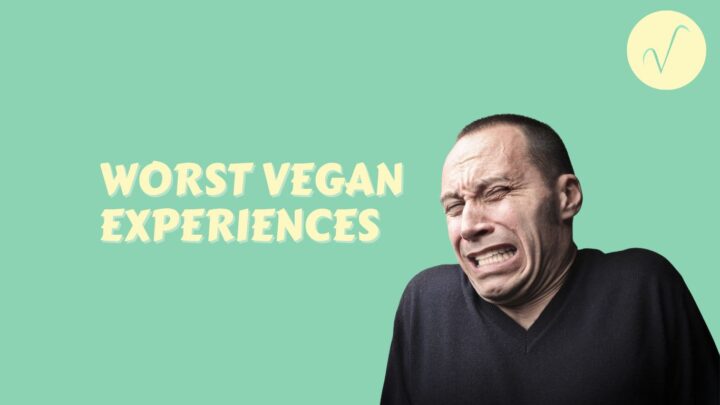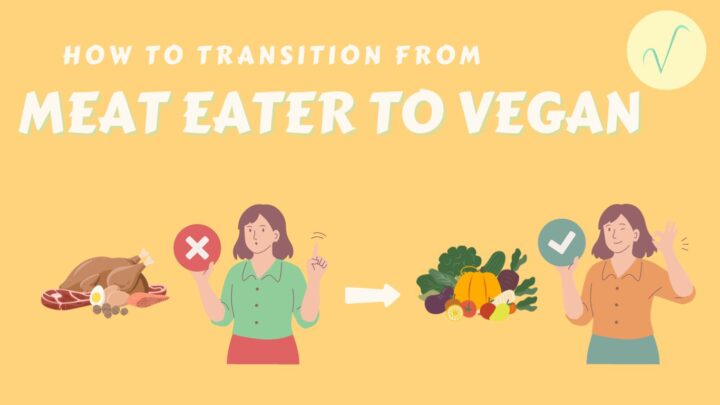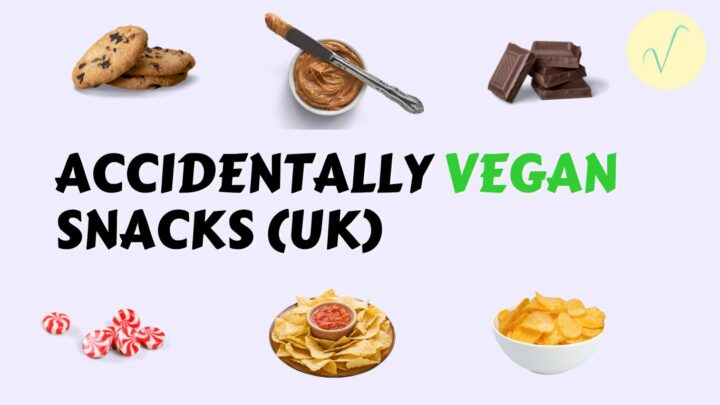The vegan diet in a nutshell: A lifestyle that restricts the consumption and use of foods and products that involve the exploitation of animals.
So as many already know, we as vegans do not eat meat, dairy, eggs, gelatine, honey or any other animal products. We avoid leather and other items of clothing that come from an animal.
Are there different types of vegan?
There are various different types of veganism, ranging from a mere lifestyle of just avoiding animal products to the complete exception of physical food. Read on to discover the different kinds of vegans and see which one would suit you best!
The ethical vegan
This is the type of vegan that has chosen to adapt to this lifestyle as they feel the exploitation of animals is unjust. Strongly led by the mindset that industrial farming in general is unsustainable and damaging to the environment.
These vegans usually converted due to their love of animals and the environment – avoid leather and sheep’s cotton; campaigning for animal rights as well as taking day to day actions to ensure they don’t contribute to animal cruelty.

The ethical vegan could also be known as the “junk food vegan” or “foodie vegan” as they do seem to not care as much about the health benefits of animal products. Tending to resort to the numerous vegan meat and junk food joints available nowadays.
Then again an ethical vegan can go deeper down the road of specifically eating only local produce. So as to limit the emissions of food transport and minimise their carbon footprint through smarter food choices.
Certainly one for the animals and the planet, ethical vegans are focused on the well-being of animals. As well as reducing their impact on the environment and helping drive the movement to gradually end speciesism.
The Keto-vegan diet
The keto diet is a dietary choice, among omnivores mainly, that is ever-growing in popularity. Limited consumption of carbohydrates (under 35g), gaining 70% of your calories from plant-based fats such as avocado, nuts, and seeds; 25% of total calories from plant-based proteins such as pulses and beans.
Usually those who follow a ketogenic diet that involves meat and dairy products end up consuming a lot of animal fat.
With studies having shown that the ketogenic diet when chronically followed, can lead to an increased likelihood of developing kidney stones, osteoperosis, and possible impaired growth in children (//www.ncbi.nlm.nih.gov/pmc/articles/PMC5452247/).

With a vegan keto diet plan you avoid the excessive saturated fat found in animal products, meats and milks; consuming more natural forms of your nutrients.
For those looking to benefit from the fat burning, low blood sugar benefits of a ketogenic diet – trying a vegan keto diet might be the decision for you!
Gluten-Free Vegan
Gluten is in virtually everything (well, not really, but a LOT of everyday foods). It’s a protein that can lead to many health complications. In the UK, 1 in 100 people have been diagnosed with celiac disease; with only 30% of people that actually have the condition having been diagnosed.
So gluten in general, is something that we all may wish to limit in our diet. But how? It’s in our pastries, cereals, snacks, SEITAN, sauces, even drinks!
The good thing about this century we’re in is the vast range of foods available; the variety of “free-from” foods being formulated to tailor to the gluten-free age we’re slowly turning into.
Gluten free bread, cakes and flour (for recipes) are now available for those who wish to limit or eradicate their intake.

A gluten free vegan, may, at first glance sound like a rather restricting diet; when you consider the vast range of plant foods available sans gluten, you start to realise that the solution to these issues is simply: Cook from home more.
There are a very many benefits to the reduction and complete eradication of gluten from your diet. These include lower cholesterol, generally better digestive health and improved energy and nutrient absorption. That combined with a well-planned vegan diet, you’d be unstoppable!
The Plant-based vegan
The plant-based vegan, initially sounds strange, as you’d expect every vegan to consider themselves as “plant-based”, technically, right?
The key differences between a vegan and a plant-based vegan is the foods they consume and a few moralistic differences.
A vegan, for instance, would ensure that they do not wear any clothing or use any products with animal products incorporated. Whereas a plant-based vegan is more health-conscious and may still wear leather shoes.

The difference when it comes to food choices is the fact that a plant-based vegan would eat a meal made up of whole, plant-based food ingredients. The everyday vegan may eat products such as chips, oreos, or other vegan snacks. These won’t necessarily count as being plant-based due to the product not being of its original plant form, i.e. potatoes.
The plant-based vegan’s main focus is health, and doesn’t limit their diet to raw foods. They only ensure they can source every ingredient in its original plant form.
A good way to approach veganism. To truly reap the benefits of a plant-based diet with the minimised consumption of processed foods.
The raw vegan
Raw veganism. A concept that seems incredibly far-fetched at first glance; for those who haven’t yet delved into the world of veganism.
You’d think vegans only eat salads then discover the range of desserts, burgers, junk food and general veganised foods; Then you hear that there’s such a thing as a raw vegan diet, a step further which involves the complete eradication of cooked food!
A raw vegan diet consists of the limitation of cooked food, or cooked between 40 and 48 degrees celsius. So a raw vegan would, instead of frying and baking food, make the most of dehydrators, blenders and food processors; Sprout and dehydrate, instead of cooking their food.

The benefits of a raw vegan diet involves more energy (from the intact plant enzymes present in the food), clearer skin, weight loss and improved digestion. Typical sources of protein would be from sprouted lentils, nuts, seeds and bloomed rice and grains.
As a raw vegan you’d experiment with a lot of dips, dried fruits, sprouting of different legumes and smoothies.
As you become more experienced in raw food cultivation, you can start to experiment with raw crackers, pizzas and bread recipes; breaking the barriers in terms of both nutritional preservation and food creativity.
Being a vegan for 2 years, I can say everyday I’m seeing better looking, raw vegan recipes. …Maybe making me consider going raw, at least for a bit! These include raw vegan snickers, crackers, pizza recipes and even quiches!
Fruitarian???
As you go deeper down the rabbit hole, you’d find a group of vegans that have truly embraced the technical term “frugivore”. Have adapted their diet to be limited to merely eating fruit with the occasional nuts and seeds thrown into the mix.
Let’s go through some of the benefits… Despite popular belief, the sugars in fruits are harmless; Easily assimilated by the body without the body needing to produce insulin.
Fruits are the easiest foods on earth for the body to digest; with melons taking 15-25 minutes to digest, to oranges ranging to 40 minutes. Fruits are mineral-rich, full of water and rich in fibre; meaning they can help you to feel satiated yet won’t cause constipation due to their high fibre content.

A fruitarian diet may be easier on your digestive system also; with beans and legumes; especially in poorly combined meals typically taking the body anything from 2 to 8 hours to process. This diet will surely help to give your digestive system a much needed break.
Remember tomatoes, cucumbers, avocados still count as fruits, and can also be incorporated into the fruitarian diet.
Reports have been shown that a fruitarian diet can lead to clarity of the mind; less mucus (due to less general harmful foods entering the body); more energy as well, fruits are pure energy!
What’s the harm in going two days of only eating fruit? I don’t see a reason why this couldn’t be beneficial short-term.
Monofruitarian
A Monofruitarian is yet another another step beyond fruitarian. With the exception being that a monofruitarian’s diet consists of one type of fruit in a day.
For instance, if they start the day with an Orange, that’s what their day’s food will consist of.
A typical meal for a mono fruitarian could be a plate of watermelon, or 3 peaches, a handful of red grapes, these mono meals (as they’re known).
Believed to be a lot less taxing on the digestive system – considering it only has to process one type of food for the day.

When looking in scientific terms, and with a bit of common sense, you start to think it makes sense; If you eat a typical full english: Bacon, eggs, sausage, beans, and toast, consisting of all those different components…
The body must produce digestive enzymes for each substance: Animal meat, eggs, legumes, gluten; Even for a balanced plant-based meal… The general food digestion process is dramatically reduced when you consider a mono fruitarian’s diet.
Benefits of mono fruitarianism include the digestive benefits: Appreciation of individual fruits and their tastes, textures, etc, and an overall simplified life.
Mind you, there may be a lot of minerals that mono fruitarians, in time, may become deficient in certain minerals; it’s advised that you follow this diet with the correct guidance beforehand.
Liquidarian
A liquidarian is one who has completely eradicated the consumption of physical food and has resorted to the intake of liquids alone.
If you’ve looked into the benefits of juicing in general, you’d know all about the digestive benefits that can come with it. Considering the rate of nutrient absorption is a lot higher when consuming nutrients in juice-form.

As the body wastes less energy on breaking down food for digestion; with juices acting as readily-available nutrient, liquidarians benefit from having a stronger immune system and a better ability to detox.
Liquidarians can utilise a wide range of fruits, vegetables, powders and herbs to ensure they receive the full range of necessary nutrients. So nutrition isn’t much of a concern, so long as you plan accordingly.
Another downside being the void of whole foods and textures one may miss, so best to try it short-term for a detox.
Breatharian (huh?)
A breatharian is another type of vegan; one that believes it’s possible to extract all necessary nutrients directly from the sun, through a dedicated form of meditation.
Of course, to clarify, we don’t condone the experimentation or attempting of a breatharian lifestyle; although we won’t argue with a 1 or 2 day fast, or one week water fast, with the appropriate preparation.
A breatharian diet kind of incorporates the concept that we are plants and only need sunlight and water to survive. It’s basically prolonged fasting, I doubt one even in the most abundant of environments could survive on solely air.
If only such a world would exist and then this website wouldn’t have to! The most I’ve gone is 7 days on just water. Was actually pretty enlightening, but it’s not a lifestyle, limit it to a few times per year at most.
In essence….
So that was 9 different types of vegan diets – Some easier to grasp the concept of than others. What they all have in common however, is the concept of not eating any products derived from animals; be it a piece of meat or drop of milk.
Drop a comment below and let us know which type of vegan diet you want to adopt for a week.
Personally I’m going to give plant based, gluten free and the raw vegan diets a go.




